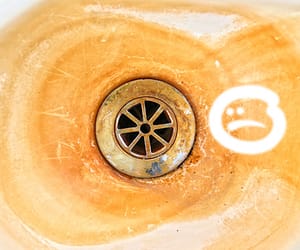Wednesday, October 6th, 2021
Common causes of rust-colored water in your home

So, you’ve turned on your bathroom faucet only to find that your once crystal-clear water has turned rust colored. Or maybe standing water in your sink turns yellow or rust colored the longer it sits. Both scenarios are common, but the causes are varied.
Whatever the reason is for seeing rust colored water, it always means it’s time to call the plumber. While iron debris in your water supply may not reach harmful levels, it can taste and smell unpleasant. And extremely high levels of rust in water can lead to iron poisoning, so it’s best to address the issue quickly to keep you and your family healthy.
Common causes of rust colored water
Your pipes
The more your home’s faucets get turned on and off, the more it causes pressure inside the pipes. Eventually, all that pressure can cause rust to separate from older, corroded pipes that in turn will get into the water supply that connects to your home’s sinks, bathtubs and showers. Often, if you notice rust colored water coming from one faucet, you’ll eventually see it in other faucets as well.
Worn porcelain enamel
If your steel water heater is ten years or older, there is a good chance that your rusty water is from worn porcelain enamel lines. Over time, the enamel can wear thin and eventually cause the steel to corrode. The enamel residue will then collect at the bottom of the water heater before making its way through the water. Rust sediment is one of the biggest reasons to have your water heater inspected and maintained once a year.
Corroded anode rod
The anode rod protects the steel lining in your water heater. Made from aluminum, zinc or magnesium, it can break down and corrode over time. Not only will this cause rust colored water, but once the anode rod starts to break down, it can no longer do an efficient job. A plumber can inspect your water heater and replace the anode rod if needed. In fact, we recommend replacing the anode rod on a regular basis.
Contaminated well water
If your home’s water comes from a well, it’s very important to clean the well on a regular basis. If you don’t, you risk rusty water from iron bacteria. While ferric iron often causes water to take on a rusty tinge, ferrous iron can cause standing water to turn brown or yellow. Iron bacteria can cause slime on the walls of the well that can get into the water supply.
Removing rust stains naturally
Ask Martha Stewart of course! Check this article out on natural cleaning solutions to get back at those tough rust stains around your home.
Beyond the temporary solution of cleaning the stains, and if you see stains reaoccuring, it’s time to call the plumber. Allied Reddi-Rooter has helped countless Cincinnati homeowners troubleshoot their rusty water problems and can help you too. Give the team at Allied Reddi-Rooter a call or Contact us. We always come highly recommended and have earned an A+ rating from the Better Business Bureau for our expert quality of service. You can follow us on Facebook, @Allied Reddi-Rooter for the latest tips or to ask us a question.
